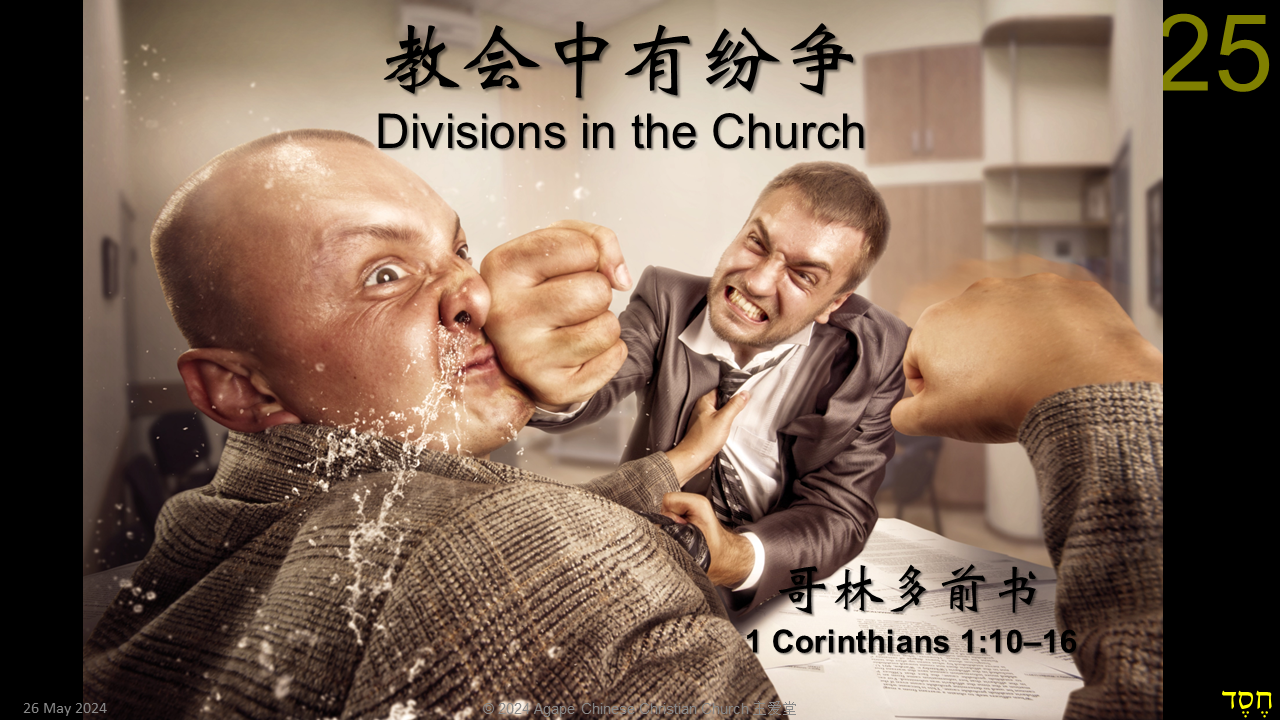教会中有纷争
Divisions in the Church
哥林多前书 1 Corinthians 1:10–16
Remember these points
I put these points at the top of my sermon-prep template to remind myself every week:
- Show that main point of passage relates to Jesus and his saving work
- (1 Cor 1:18) A truly gospel-centred message will not be acceptable in a synagogue or mosque
- Did I proclaim the gospel as the headline news of the sermon, rather than as a “by the way…”?
- Unbelievers are called to repent, believe, and be saved
- Believers are encouraged to abandon their old self, renew their minds, put on the new self in Christ
- Preach simple sermons, so that God’s people can see Christ more clearly and love him more dearly
News
Hook
Fighting Within the Church?

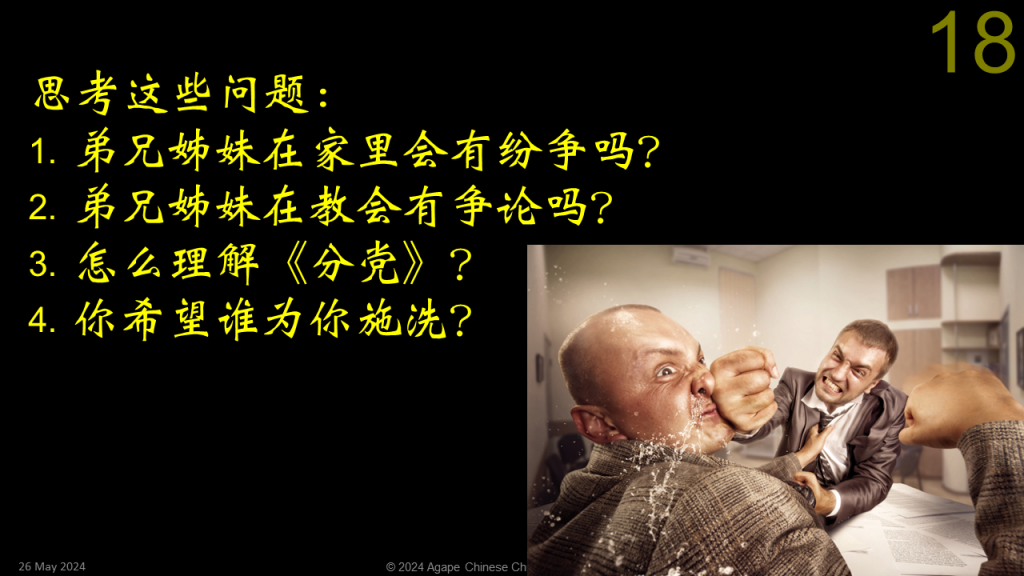
Some questions to think about:
- Brothers and sisters in a family, do they fight?
- Brothers and sisters in church, do they argue or fight?
- How do you understand 分党? (This is really a question of CUV’s translation)
Passage
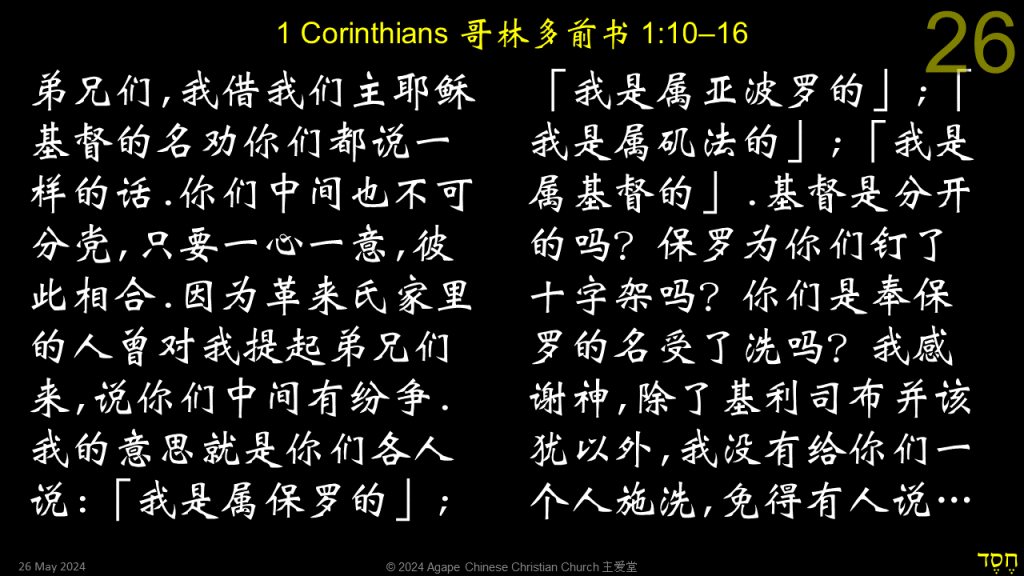
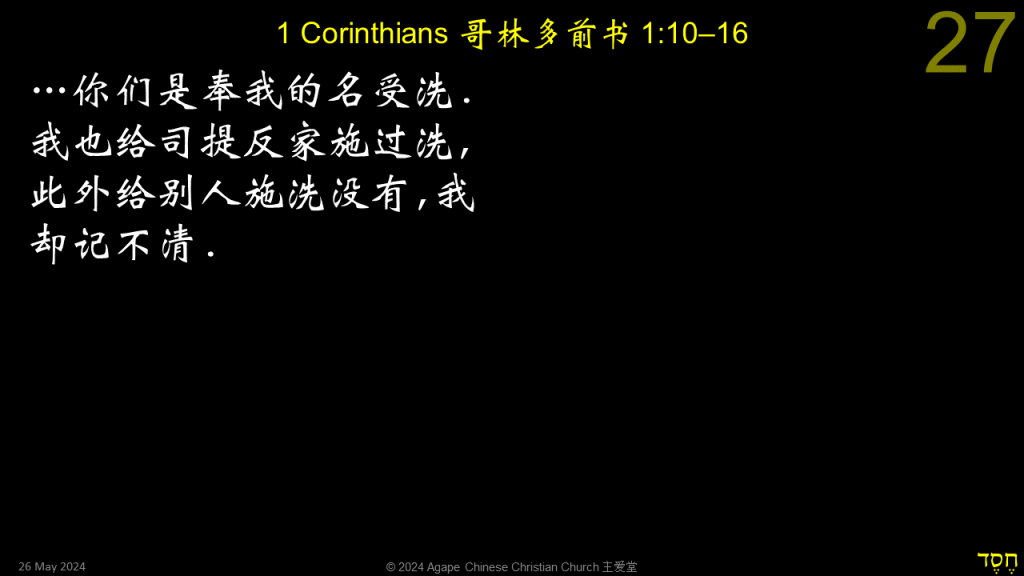
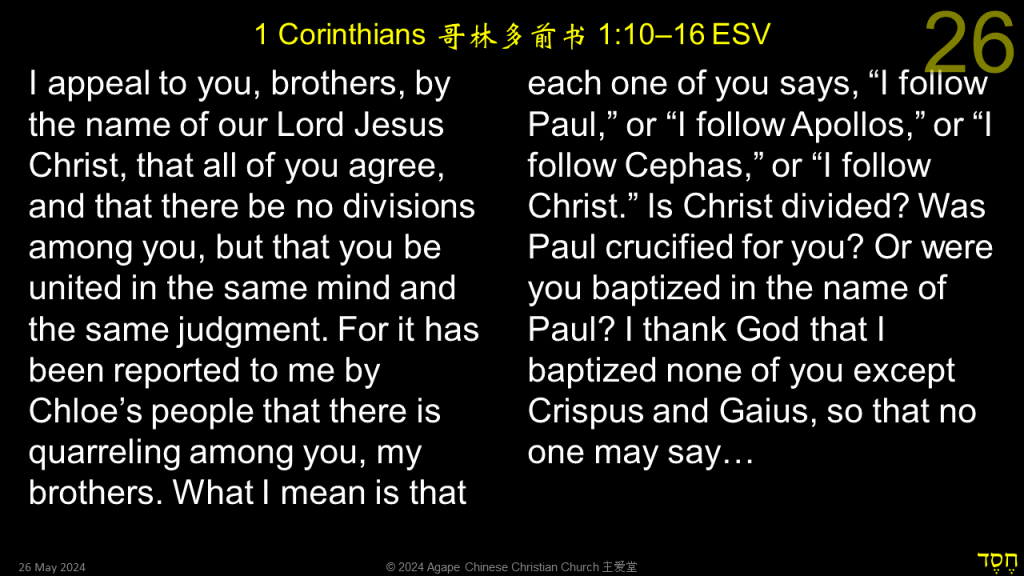
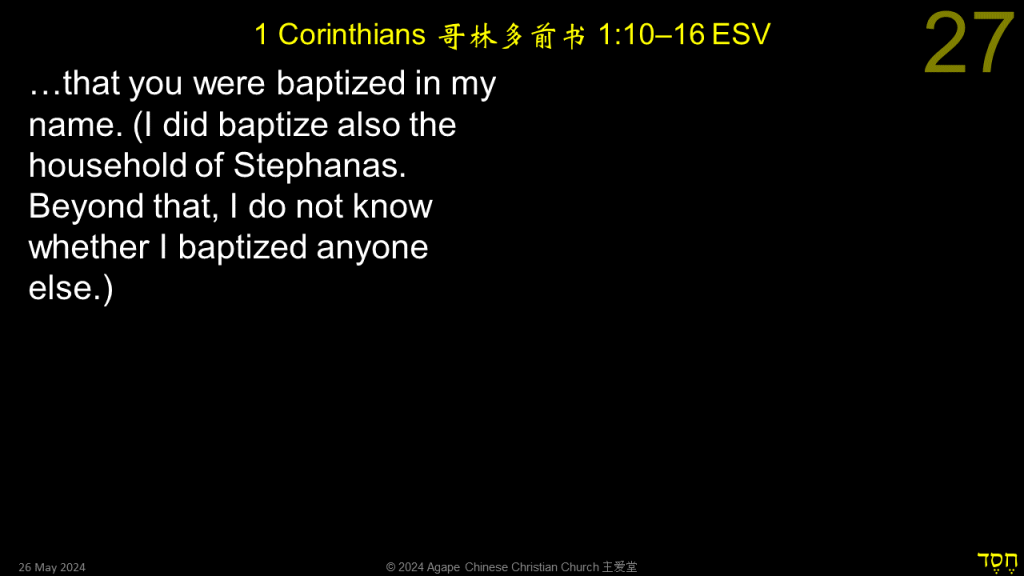
Outline
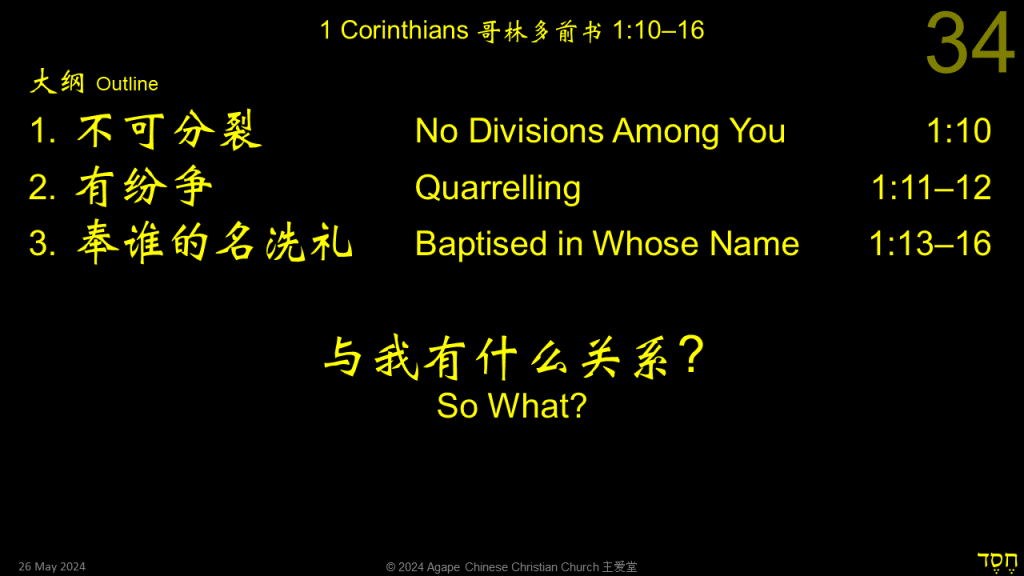
Section 1 不可分裂 No Divisions Among You 1:10
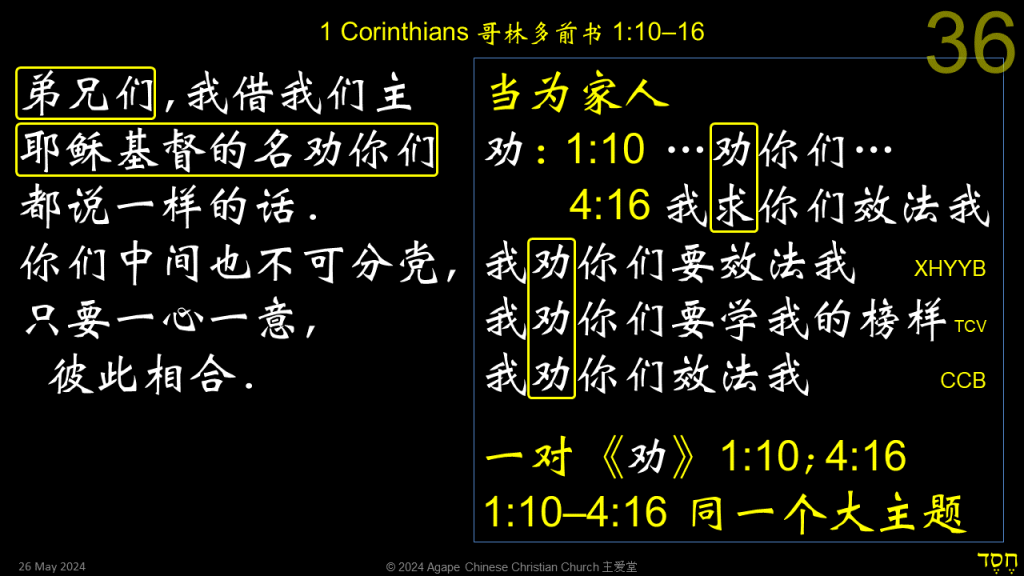
“Brothers” in the original Greek, but we understand the term to mean both men and women in the church.
Paul is treating them like family, a family in Christ.
The verb “appeal” appears in 1 Cor 1:10 for the first time in this book, and again in 1 Cor 4:10.
In CUV, the translation of the same verb in 1 Cor 4:10 uses a different word, so the translation obscures this bookend. Newer Chinese translations all made sure to use the same Chinese word in both cases.
These are like bookends, showing that this is one block with one main theme: Divisions in the church.
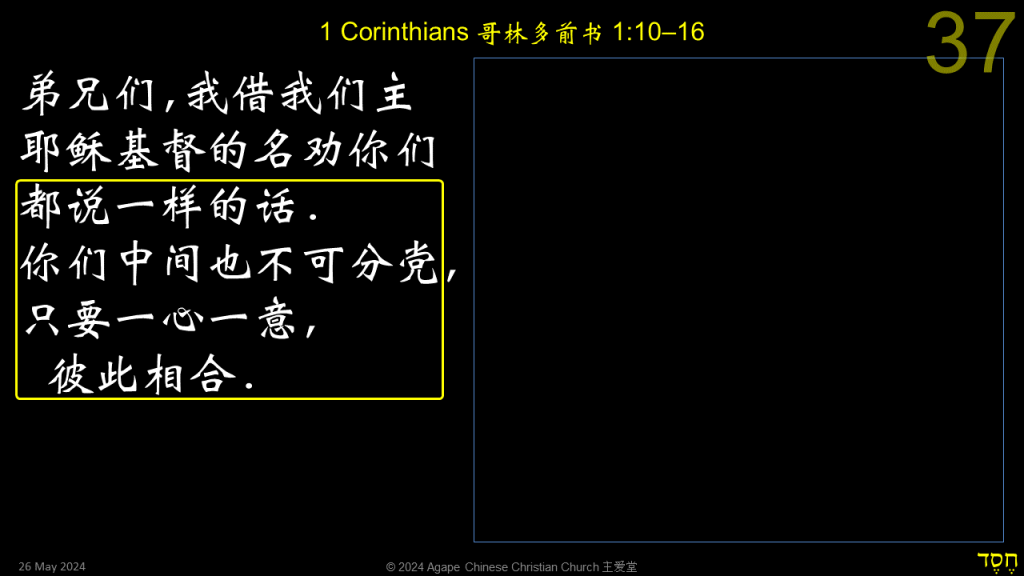
This latter part of 1 Cor 1:10 is a simple chiasm. See next slide.
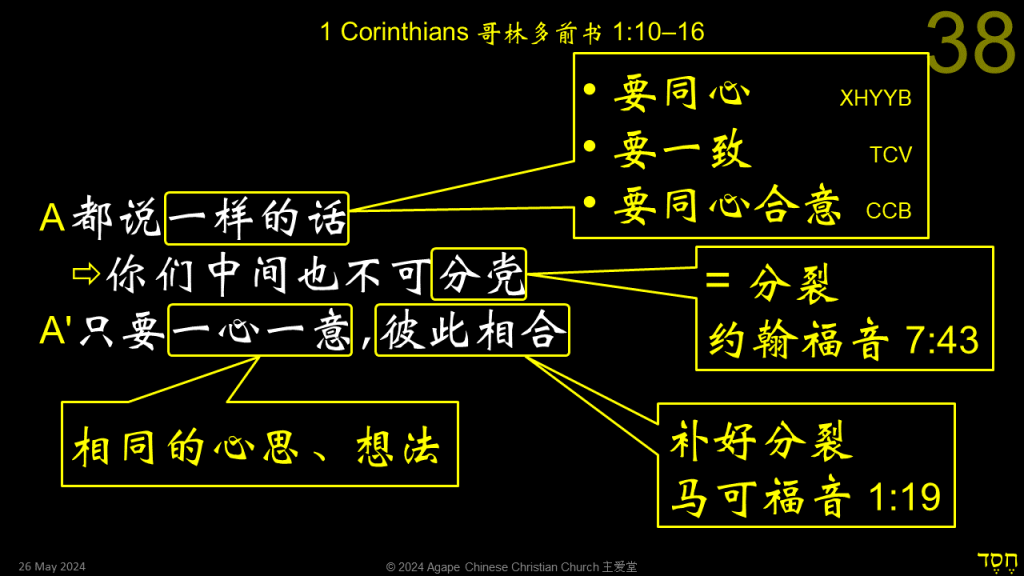
说一样的话 is actually the literal translation of the Greek. The meaning is they should all agree.
Newer Chinese translations all interpret 说一样的话 as “they should all be in agreement.”
It doesn’t mean we should all say exactly the same things (1 Cor 12 shows that diversity of gifts is important in a church).
分党 sounds like having separate groups or cliques. The verb actually means a split or tear (as in a tear in a piece of cloth). So ESV translates it as “division.”
John 7:43 uses the same verb: people were divided as to their different opinions of Jesus (they’re not forming cliques, not 分党).
They should be of the same mind and understanding (translated “judgement” in ESV).
彼此相合 is the opposite of tearing or splitting: it means to mend. Like in Mark 1:19, the disciples were mending their fishing nets.
Lessons
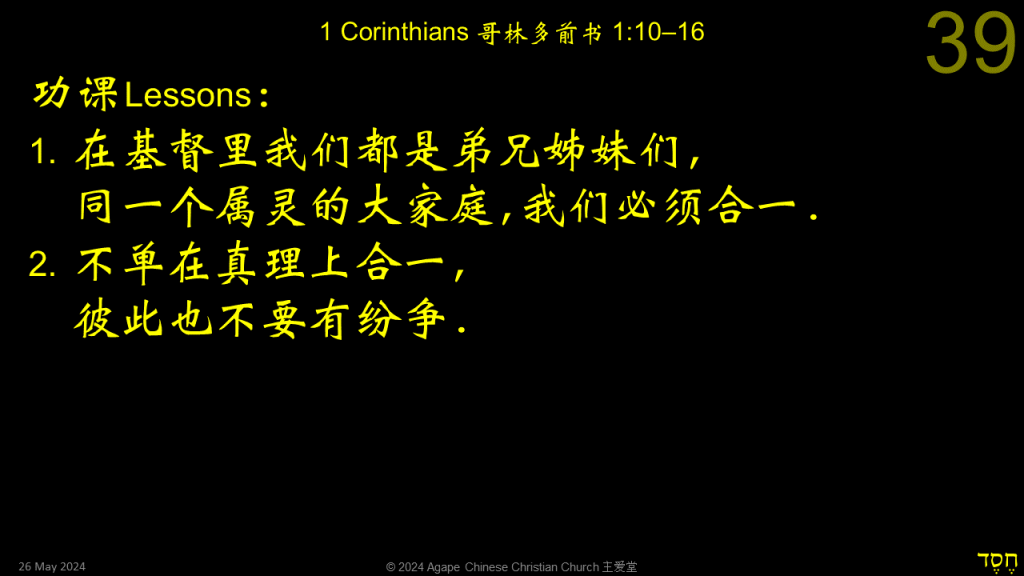
- We’re all brothers and sisters in Christ, we belong to the same spiritual family.
We must not have divisions among ourselves.
We should be of one mind and thought. - We are in agreement not only in doctrine (theology), but we shouldn’t have splits and divisions among ourselves.
Section 2 有纷争 Quarrelling 1:11–12
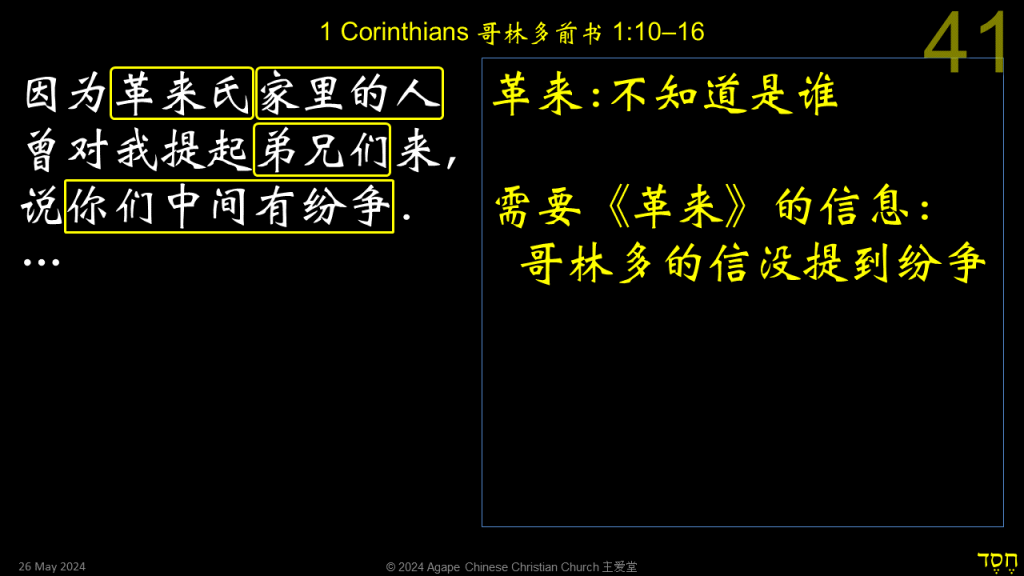
We don’t know who Chloe is, just that it’s a woman.
“Chloe’s people” CUV translates it like “Chloe’s family members.” These people are most likely Chloe’s business associates or employees, not her actual family.
Paul needed the news from Chloe to know the full extent of the problems in Corinth. This means the letter that they wrote him (which we no longer have) didn’t really tell him their problems, especially not their splits and divisions.
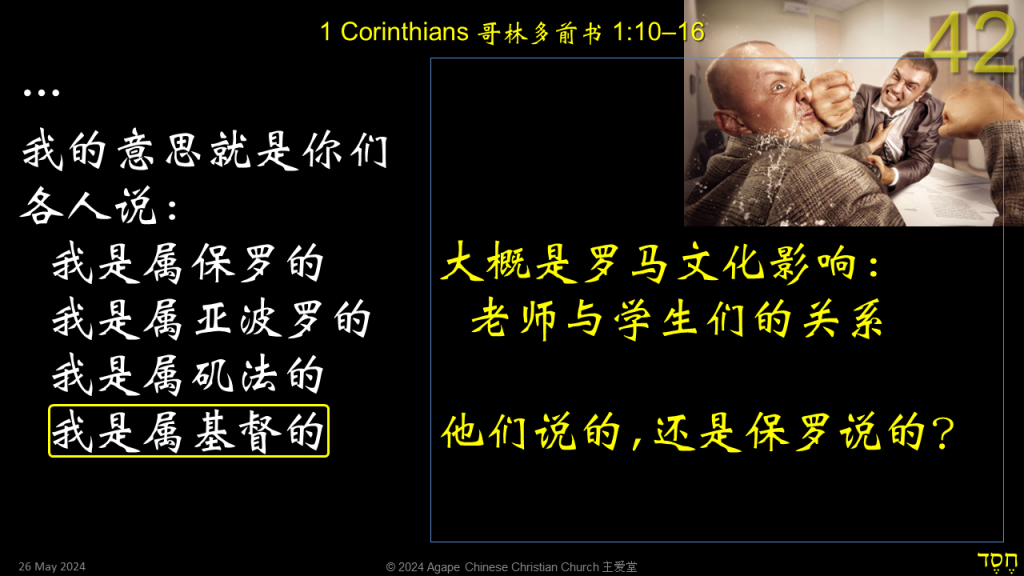
They’re arguing over which apostle they “belong” to!
This is most likely influence from Roman culture (Sophist teachers and their devoted students).
We’ll talk about this next time.
The final sentence: “I follow Christ,” was Paul quoting the Corinthian church, or is he referring to himself? Some commentators think this is Paul telling them that he himself follows Christ.
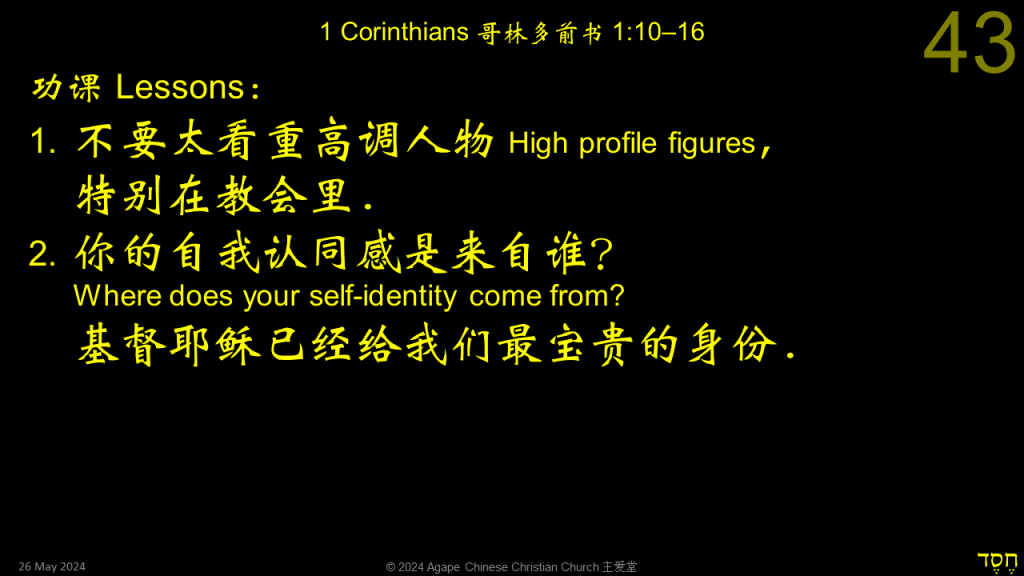
Lessons
- Don’t be too attached to, or too enamoured, by high-profile figures, especially in the church.
- Where do our identities come from?
Christ has already given us the highest and most precious identify.
We are the children of the Creator of the Universe, what more do we want?
Section 3 奉谁的名洗礼 Baptised in Whose Name 1:13–16
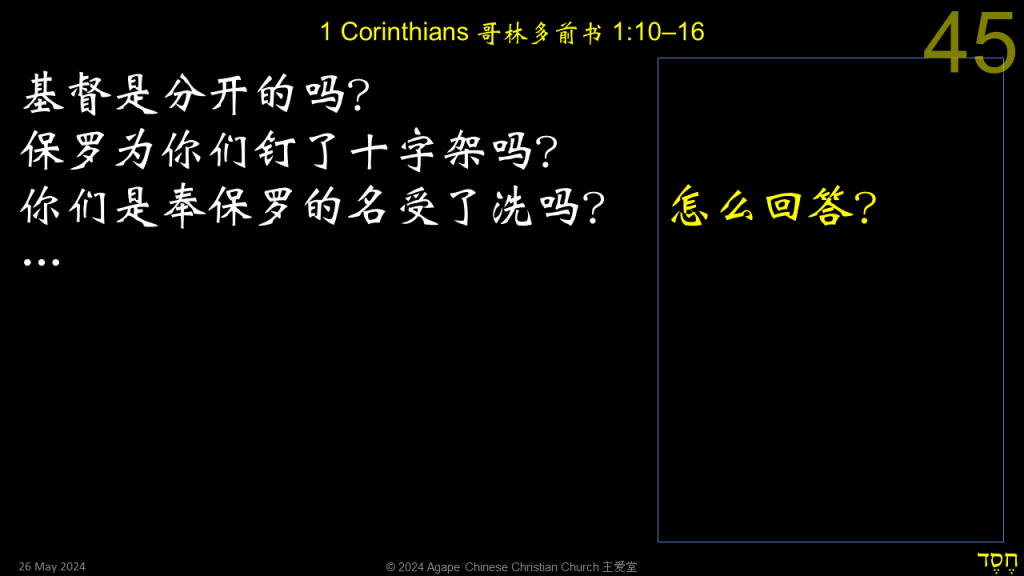
How would you answer these questions?
The expected answer to all the questions is “No!”
The Corinthian church seems to be answering “Yes!” This is evident from the splits and divisions that Chloe reported.
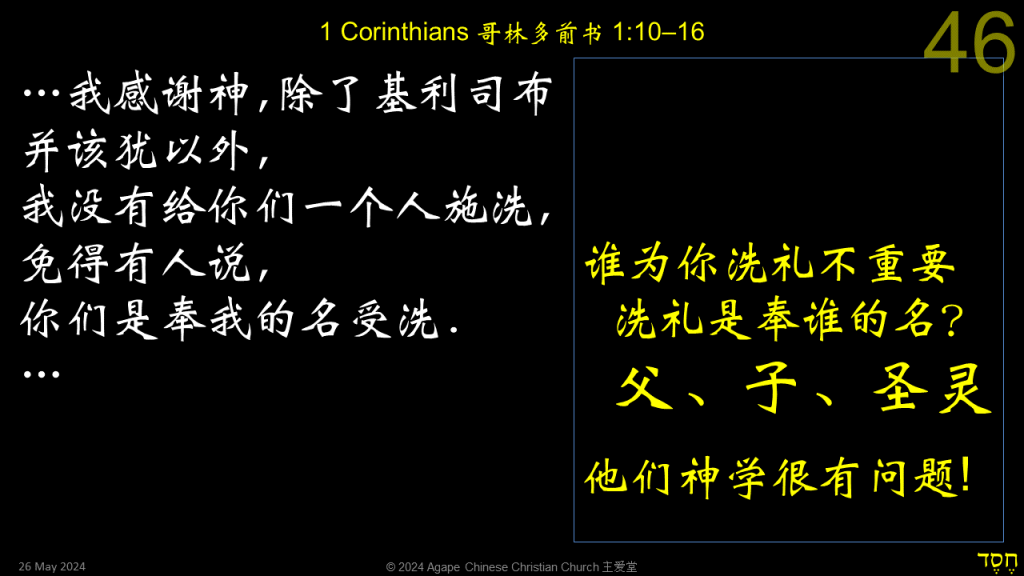
Who baptised you is not important.
We are baptised in the name of whom? The Father, Son, and Holy Spirit (Matt 28:19).
The Corinthian church has really bad theology!
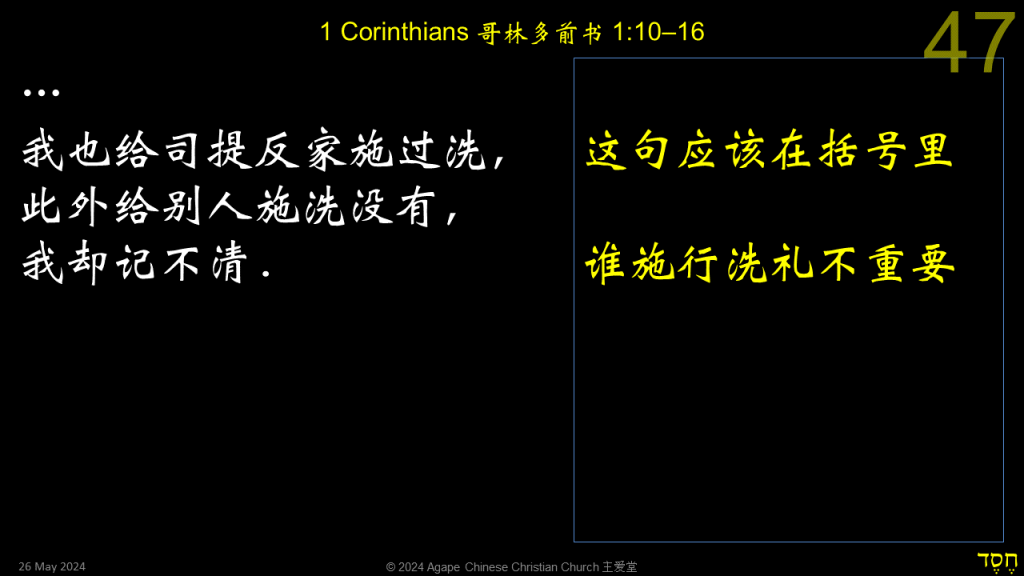
This sentence should be in quotes. It looks like an after-thought by Paul.
This again shows that Paul doesn’t care who baptised them, or whom he baptised.
Lessons
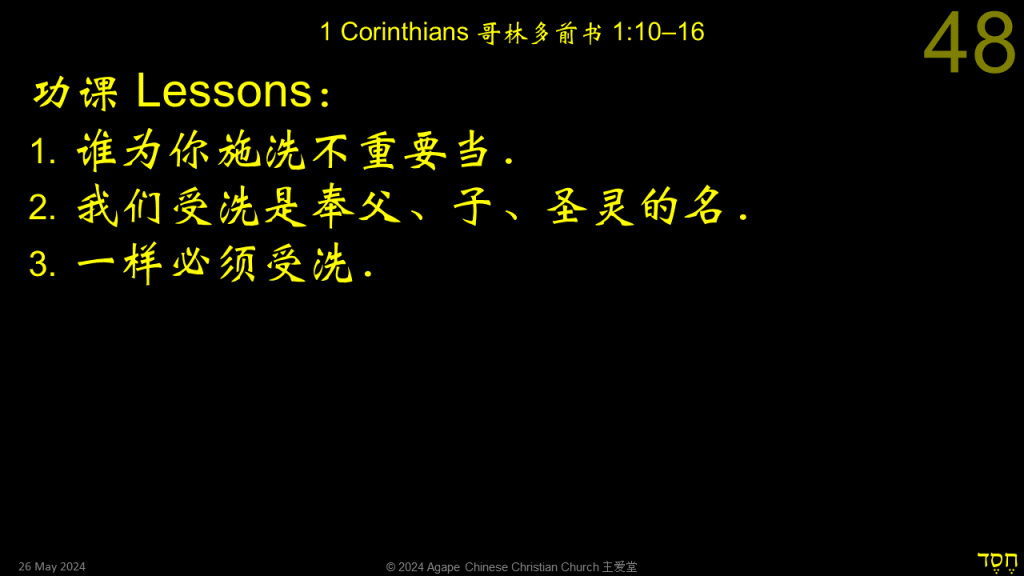
- Who baptised you is not important.
- We’re baptised in the name of the Father, Son, and Holy Spirit.
- But all the same, we should be baptised.
与我有什么关系? So What?
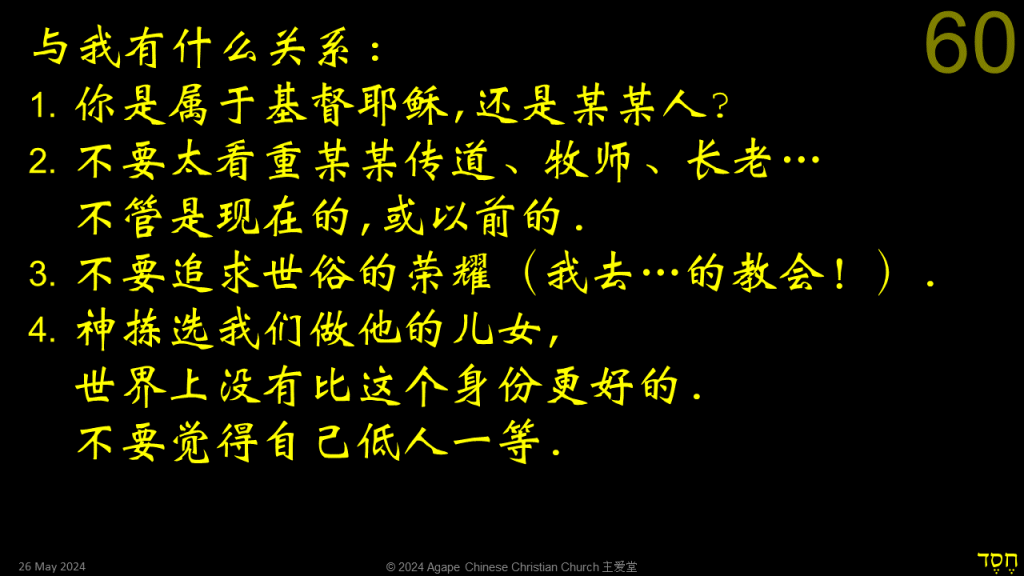
- You belong to Jesus Christ, or to some other person?
- Don’t be too enamoured or attached to some preacher, pastor, elder, etc.
No matter if this person is living or is from the past. - Don’t look for glory from this world like others do (“I go to <somebody>’s church!”)
- God chose us to be his children, no other identity in this world can match this.
Don’t feel that you’re inferior to others.

